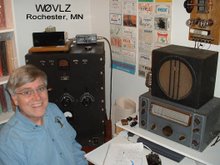Wednesday, November 21, 2007
NC-57 Project with comments about the NC-125
For the past few days I've been going through my NC-57. This radio was marketed by National in the late 40s and early 50s. Features include a built-in speaker, electrical bandspread (uncalibrated), regulated B+ for the HF oscillator and a tuned RF stage. Advertised frequency coverage was .54-55MHz. See http://www.io.com/~nielw/nat_list/nc57.htm for more information.
My set had been already gone through by a previous owner, recapped and aligned. This set includes an extra dial string in the bandspread tuning assembly to overcome slipping. While this radio generally worked it also would go dead once and a while for no apparent reason. Close inspection revealed a cracked solder connection on a filament pin of the 6H6 detector. Resoldering this connection fixed the problem.
Properly aligned, the calibration was excellent and sensitivity good but this radio is still only one step removed from a simple SWL receiver. Mechanical and electrical stability is marginal, especially above 40 mtrs. It was no surprise that SSB and CW signals easily overloaded the receiver and BFO. Operation with the BFO requires running the AF gain wide open and controlling volume with the RF gain control. I did like the positive feel of the main tuning. While National used a failure prone dial string for bandspread tuning, main tuning uses a gear/pinch wheel mechanism.
Three years after introducing the NC-57 National came out with the NC-125. Under the covers this "new" receiver was simply a NC-57 with the internal speaker replaced by an S-meter and Select-O-Ject audio filter. Both of these features were available as options on the NC-57. National also replaced the round dials with slide rule dials. Unfortunately National took a step backwards by using slip prone dial strings on both the bandspread and main tuning. The Select-O-Ject feature, while unique, does nothing to remove the audio image. I believe a Q-multiplier similar to the Heathkit QF-1 would have been more useful.
I acquired a tilt base with my NC-57. Besides tilting the radio front for easier reading, this also allows a ham to add extra station controls and some accessories without cluttering up the shack. High on my list is a 1MHz crystal calibrator to help set the main tuning for repeatable bandspread calibration over each ham band.
I plan to use my NC-57 on 80 and 40 with one of my early novice transmitters.
Subscribe to:
Post Comments (Atom)


No comments:
Post a Comment